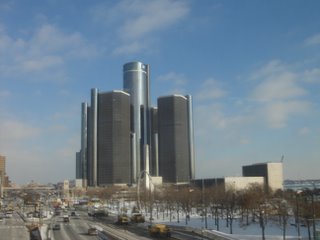This article is from this months issue of Forbes - if anyone cares
Backseat Driver
Detroit: Heal Thy Self
Jerry Flint, 01.05.06, 11:50 AM ET
The strangest thing about the crisis in the American auto industry is this: Nobody outside of Detroit seems to care.
General Motors (nyse: GM - news - people ) could go down. Ford Motor (nyse: F - news - people ) could go down. If either company fails, hundreds of thousands of workers could lose their jobs and health benefits. I'm not saying that this is going to happen. I'm just saying that the American people and the leaders in Washington don't seem particularly concerned about the traditional U.S. auto industry.
I remember when we used to say that one in six jobs in America was connected to the automobile industry.
I remember in 1953 when the head of General Motors, Charles E. Wilson, said, "What is good for the country is good for General Motors and vice versa."
I remember when the folding of a small automaker, little Studebaker, was a big story on the Dow Jones ticker, the front page column of the Wall Street Journal and got the journalist who broke the story promoted to executive editor.
When I arrived in Washington to head the Forbes bureau there, Ronald Reagan was taking office, and the big story (once the Iranian hostages were released) was the loan guarantee to save Chrysler. People actually cared. This position was not unanimous, but most of those in the Congress wanted to save Chrysler.
Congress forced the United Auto Workers to make concessions to Chrysler before giving the company's chairman at the time, Lee Iacocca, his loan guarantees. That deal actually turned out to be hugely profitable to the government, which demanded stock options from Chrysler at the last moment before sealing the deal.
I doubt that either General Motors or Ford could engineer a similar government bailout today.
These days, most Americans already buy cars made by foreign companies. If you pull out all of Detroit's business with the rent-a-car and fleet buyers, you'll see that true retail sales by Toyota Motor (nyse: TM - news - people ), Honda Motor (nyse: HMC - news - people ) and Nissan (nasdaq: NSANY - news - people ) easily top those of Chevrolet and Ford. And Chrysler is now owned by the Germans.
The new auto industry in the U.S. is largely in the South. This part of the business is growing and hiring--and is nonunion. The Japanese, Germans and Koreans have plants in Alabama, Kentucky, Mississippi, South Carolina and Tennessee. Toyota is building a plant in Texas. Each of those states has two Senators and House members interested in protecting the foreign factories in their states, not doing favors for Michigan.
In the fat years of the 1980s and 1990s, U.S. companies squandered profits on misguided acquisitions and poor product decisions. Too many Americans once owned Detroit cars and believed that dealers and the companies mistreated them when their vehicles had problems. In short, a sizable percentage of the American public is not sympathetic to the plight of the domestic manufacturers.
The United Auto Workers union and its members have an image problem, too. Sure, in recent years GM and Ford have made progress in working with unions and in achieving improvements in quality. However, for far too long UAW workers laughed at complaints about quality, and the union did nothing to punish workers who failed to perform. In terms of pay, pensions and health care, UAW workers are better off than most Americans in private industry.
How about the U.S. Government? Well, the Treasury Department doesn't care if U.S. car companies go out of business and workers lose their jobs. The Treasury's big job right now is financing the nation's deficit, and they do it by selling bonds to the Chinese and Japanese. The Asians get that money with profits from their sales and exports to America.
The Defense Department is the other important agency in Washington. Hey, if people are unemployed, maybe it will be easier to fill the army's ranks. Like the State Department, Defense does not want the Asians angry with us because of trade. The attitude is that we need them on our side militarily, so let them have their way with trade.
Detroit executives wonder why Washington has not done anything for 40 years about unfair exchange rates that make Asian products exceptionally low priced here. Simply put, relations with Japan, China and Korea are more important that some shut factories in the rust belt. Rick Wagoner, the boss of General Motors, in particular, complains about health care costs. He seems to want a national health care system to bail out his company. Frankly, it is difficult to see America accepting what we used to call "socialized medicine" just so GM and its workers can continue to have a better medical plan than the rest of us.
Maybe it is time for the companies to stop their dividends. Maybe it is time for the union to tell its members how bad things are. And maybe it is time for the Governor of Michigan to understand why people don't want to build in her state.
Face up to it Detroit: America doesn't care. You have to save yourselves.

























